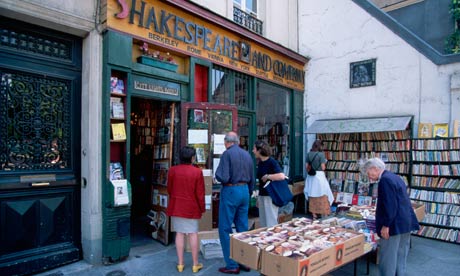
Bookshop owners in Britain could be forgiven for casting envious glances across the Channel as they watch their French counterparts successfully fight government attempts to increase VAT on printed books. "Culture should be a political priority," the Socialist presidential candidate François Hollande has been quoted as saying, a view that has strong resonance in a country where discounting books beyond 5% is still forbidden and independent bookshops are supported by tax breaks.
By contrast, independent booksellers in the UK feel only the cold air of commerce as they open their doors to the dwindling number of customers who still brave Britain's high streets and are prepared to pay full prices on books discounted to excess by Amazon and supermarket groups. The closest UK politicians – of whichever hue – come to supporting bookshops is when they flog their autobiographies through them. As a result many independent bookshops have simply closed their doors. There are perhaps just over 1,000 independents left in the UK; by contrast France boasts about 3,000.
This has prompted some in the industry to call on the government to support independents in order to protect "the wellbeing of society". If that sound familiar, it is – the same argument is being made to save public libraries. Librarians may yet win their case, but it is hard to imagine politicians will rush to the support of a retail sector that still sells more than £1bn worth of books each year.
Besides which, the picture from the bookshop floor is more complex. While there has been, without doubt, a decline in physical shops selling printed books over the last decade, this has come after 20 years of growth in shelf-space, as chains such as Waterstones and Borders overexpanded and supermarkets turned a lascivious eye to bestsellers.
Roll-back 15 years, and it was this expansion that was killing indies, not the twin devils of digital and discount.
Furthermore, the way readers buy and use book content is undergoing a revolution as digital reading grows. Over the next few years we are likely to see a rise in new booksellers such as Kobo, the Canadian ebookseller, and new ways of selling books, with social platforms such as Anobii and perhaps even Facebook becoming spaces where books are discovered, recommended, and sold.
No amount of government subsidy will change this, or hold back the global giants such as Amazon, Apple and Google who are vying to become tomorrow's bookshops. And the problem with the French system is that it makes high-street bookselling appear uneconomic – fluffed up by artificially high book prices and state subsidies, with the attendant risk that bookshops will be left looking increasingly outmoded.
Yes, independents are the life-blood of the book business – they can make and break authors and support fledgling publishers in ways non-stockholding retailers cannot. They help shape the nation's literary tastes and are the visible link between the reader and author. Without their tireless championing of new writing, literary diversity will shrink – yet aspic is simply not a good look for bookshops, and is unappealing for authors, who now have more ways than ever before to get their content to market.
What independents really need from the government is a level playing field. Closing tax loopholes that allow Amazon to sell ebooks out of Luxembourg at a VAT rate of 3%, compared with the British VAT rate of 20% on ebooks, would be a start. Bringing forward the government's response to Mary Portas's high-street review would also help, particularly if rate relief was offered for smaller businesses, and the response helped usher in a planning environment that favoured local and individual retailing over out-of-town shopping centres.
But even this won't be enough to preserve most indies if their businesses simply go out of fashion. The secret is to make sure this does not happen. Shelf space is now at premium – and bookshop display remains the best way of promoting writing and discovering new writers, even if it is later bought and consumed online.
Publishers need to recognise this and put a value on it by paying up-front for display space, bringing out beautiful editions that are made available only in stores or showcasing new titles first in bookshops. Here we can look to the continent, where the French have an annual festival celebrating new books called the rentrée littéraire, which encourages book readers to head into shops and browse the new works.
Bookshops also need to find a way of making money out of the way they intereact with customers so they make a return, even if the customer seals the deal elsewhere. Some have been experimenting with paid-for author readings, subscription-based reading clubs or, as in the case of London indie The School of Life, evening classes and paid-for "bibliotherapy". Bookshops also need to be where readers are going to discuss books, online. Too many still operate websites built in the last century.
Talk of subsidies suggests the bookshop model is broken: that is moot, but it will never be fixed if the taxpayer has to pick up the tab.

